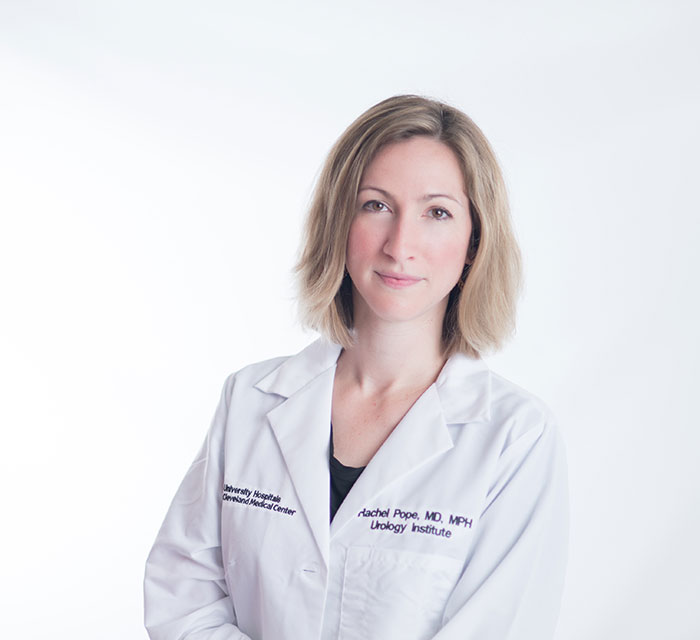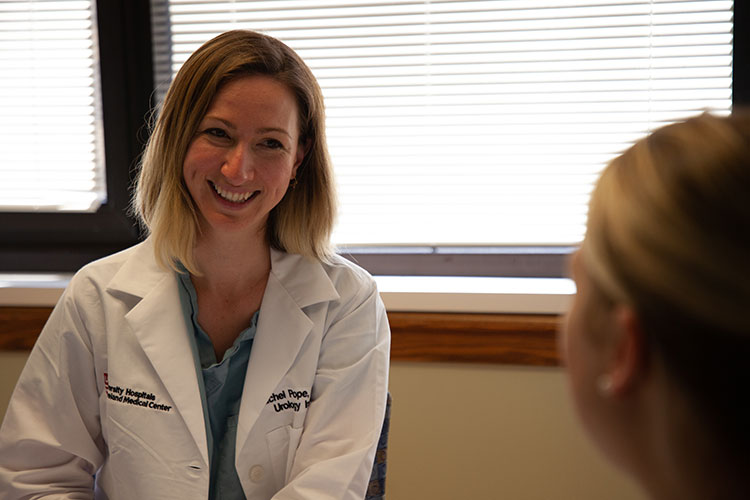Starting the Conversation about Women's Sexual Health
July 07, 2021
Program helps educate primary care physicians on future of non-reproductive aspects of care
Innovations in Urology | Special Issue | September 2021
At University Hospitals Urology Institute, Rachel Pope, MD, MPH has carved out a place for women to receive care for non-reproductive aspects of sexual health, a focus not typically found in most urology and gynecology programs.
 Rachel Pope, MD, MPH
Rachel Pope, MD, MPHAn obstetrician/gynecologist at University Hospitals Cleveland Medical Center, Dr. Pope’s program is making primary care physicians more aware of the future of female sexual health and how they can approach the conversation with their patients.
“So much of gynecology focuses on taking care of the reproductive aspects of women’s sexual health, including pregnancy and infertility,” says Dr. Pope, who has fellowship training in global women’s health. “However, women are more than reproductive beings; they are sexual beings and there is a whole science behind that. To that end, where do women go when they are having gynecology issues not related to reproduction? There’s a need for these services and our division is trying to meet that need.
Transcending barriers
The Urology Institute's Female Sexual Health Division is a collaborative effort that breaks down the barriers between traditional gynecology and urology specialties with the goal of diminishing the discomfort women experience when talking about sexual dysfunction. Sheryl A. Kingsberg, PhD, a clinical psychologist whose specialty is in behavioral medicine and sexual medicine, has been instrumental in laying the foundation for women's sexual health at University Hospitals, and she continues to raise the visibility of this important topic as a national spokesperson.
Today the team includes two behavioral health specialists who specialize in sex therapy and sexual health; a pelvic floor physical therapist; and two nurse practitioners with additional training in sexual health. Dr. Pope provides surgical care, such as vaginal reconstruction, as needed. A sexual medicine board will offer providers an opportunity to present difficult cases and help create treatment plans as part of an interdisciplinary team.
“We can address a woman’s sexual health issue from all angles and offer holistic, coordinated care, so she doesn't have to make multiple appointments and wait for follow up,” Dr. Pope says.
Understanding women’s specific needs is crucial, so UH is also forming a patient advisory board, which will include representation from women of all ages and demographics.
“We want to know what is important to women, what they struggle with, so we can improve our services,” Dr. Pope says. “It’s really important to have patients’ perspectives and to understand what their issues are before they come in for appointments.”
Start a conversation


Sexuality is an integral part of a woman’s overall health across her lifespan. However, women tend not to volunteer information about their sexual health and providers don’t always ask because they feel unqualified to address these issues or don’t have time during a normal office visit. Furthermore, many providers underestimate the prevalence of sexual dysfunction.
Dr. Pope encourages any physician who sees women to ask and empower them to open up. “A simple question could be, ‘Are you having any issues in your sex life?’” she says. “If the patient says yes, reassure them there are experts who are focused on addressing their needs and concerns.”
Many patients believe that vaginal atrophy, dryness and other conditions that cause pain or discomfort during sex are a normal part of aging. They don’t have to be. Furthermore, Dr. Pope says, there are new treatments recently approved by the Food and Drug Administration that can help women address symptoms of Genitourinary Syndrome of Menopause and Hypoactive Sexual Desire Disorder.
As with many of the other disciplines in urology, the field of women’s sexual health is drawing interest from many female medical students who are interested in the fields of urology and gynecology, Dr. Pope says.
“The next generation of trainees includes many more women,” she says. “It’s exciting. Many women physicians didn’t know they could do sexual medicine in urology and the Urology Institute makes women feel welcome.”
For more information, or to refer a patient to the Female Sexual Health Program, contact Dr. Pope at 216-553-1595.
Contributing Expert:
Rachel Pope, MD, MPH
University Hospitals Urology Institute
UH Cleveland Medical Center
Clinical Instructor
Case Western Reserve University School of Medicine


